Custom dyed pashminas have a minimum order of 100 units Contact [email protected] for more details Pashmina is the Indian name for fine Cashmere wool. Pashmina is remarkably light, soft and warm, and feels comfortable against the skin. Pashmina comes from the word pashm, from the Persian word for "wool," refers to the under fur of a type of goat, and is commonly uses for making shawls. These goats are indigenous to high altitudes of the Himalayan Mountains and the fleece from these animals has been used for thousands of years to make shawls that are among the warmest natural fiber scarves you can buy. The best pashminas need the annual growth of three goats to make one shawl. Fortunately there are a range of pashmina blends that are now available at cost effective prices. Perkal Gifts offers a wide selection of pashmina, available in cashmere blends, viscose, silk wool, wool and 100% pashmina; with a variety of colours and designs of pashminas as corporate gifts. A pashmina can be worn draped fully over the shoulders; folded lengthways and draped around the shoulders to give more of a stole-like effect; and they look equally elegant worn low on the arms with evening wear. In winter, a pashmina can be worn over a coat, or folded at the neck to wear as a muffler.
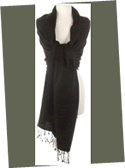 Pashminas Pashminas The pashminas are dyed up according to colour charts, which makes a pashmina a wonderful corporate gift that can match your corporate identity. Branding of these pashminas can be done by creating a customized sew in label for this garment. Please note that Perkal Gifts is a corporate gift supplier and only sells pashminas as corporate gifts and not on a retail basis.
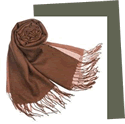 Cashmere Pashmina Cashmere Pashmina There is much confusion regarding the terms cashmere and pashmina. Traditionally, "Pashmina" is the Persian word for pashm meaning finest wool fibre, the "soft gold" king of fibre’s. Pashmina is the original term for the pashm, once it has been spun into yarn. However, since Napoleons time, Europeans have used the word Cashmere to describe this fibre whilst the term pashmina has been used to describe the traditional shawl or stole that is made of either pure cashmere, or a mix of cashmere and silk, and is draped over the shoulders by Nobles and Royalty. At Perkal Gifts we offer, cashmere pashminas, silk blend pashminas, viscose pashminas and pure pashminas. A cashmere pashmina on a quantity of 150 units will be R447.00 excl VAT depending on the rand value.
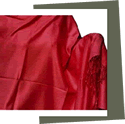 Silk Pashmina Silk Pashmina Pure Pashmina is a luxury even in India so local weavers combine the Pashmina fibre with silk to impart durability and lustre to the material. Woven by from soft pashmina cashmere and fine silk. This pashmina combines the Pashmina fiber with silk to impart durability and luster to the material. The silk pashminas have a two tone colour effect to them and add glamour to an evening function. These pashminas have a soft a luxurious feel to them.
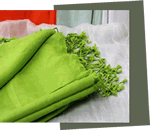 Viscose Pashminas Viscose Pashminas Another type of Pashmina, is made of viscose and it is soft to feel and very comfortable on the skin. This a very cost effective option and give a beautiful colour when made up to order. Pashminas are available in viscose blends which are cost effective and can be used in mass promotions due to their affordability. For example a quantity of 150 units pashminas without branding will be R 82.00 excl VAT depending on the rand value. Contact [email protected] for more details
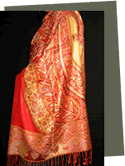 History of Pashminas History of Pashminas Imagine the icy temperatures that blast from the high plateaux of Mongolia and Xinjiang in China. Imagine temperatures falling to –40C. Imagine the freezing wind that whips through the glaciers and mountainsides. It is in this 14,000ft, forbidding region, that the beautiful Himalayan mountain goat (capra hircus) roams. To survive this inhospitable environment this wonderful animal grows a unique, incredibly soft pashm, or inner coat, six times finer than human hair. Known in the west as cashmere, this is one of the world's most rare and precious fibres; soft to handle, light and warm, and to wear it is to be insulated in your very own summertime. Every spring/summer, Himalayan farmers climb these mountains to comb the fine woollen undercoat from the neck and chest of, the Capra hircus goat. The fleece consists of the very fine, crimpy down and the usually longer, outside, coarse, straight guard hairs. Cashmere fibers must be separated, either by combing out the down or by using a commercial dehairer on sheared fibers. It is painstakingly sorted to remove any coarse hairs, sand and loose dirt reducing the yield. A yield of at least 30 percent down is desirable, but is not the average by any means. Buyers pay on the down weight or weight of dehaired fiber, not the weight of the entire fleece. The longest, finest down is used in knitted garments and the shorter down in woven fabrics. Because it is only 14-19 microns in diameter (the fiber must be under 19 microns to be labeled cashmere), it cannot be spun by machines, so the downy wool is hand-woven into shawls. It takes the wool of three goats to produce one pashmina shawl. The beautiful vale of Kashmir has always been famed for its craftsmanship of its pashminas. The weaving of tapestry shawls was first introduced into the valley from Turkistan, by Zain-ul-Abdin, the ruler of Kashmir, in the 15th century. Production benefited from the patronage of the Mughal rulers like Akbar and his successors, who wore these shawls, and also because of patronage of local government. The collapse of the Mughal Empire left many weavers unemployed. The situation however, was saved by the enormous increase in demand from Europe, where the shawls became popular in the latter part of the 18th century. The European market for shawls collapsed in 1870 due to a combination of factors such as changing tastes and competition from Paisley shawls. The economic prostration of France when she was defeated by Prussia added to the declining European market. The Kashmiri weavers either left the valley for Punjab or started producing embroidered shawls for tourists; mainly British officers on furlough in colonised India.
Banned Ring Shawls  Coveted by the super-rich and fashionistas alike, shahtoosh has a mystique like no other. Shahtoosh, which means 'king of wool' in Persian, is so fine, light and translucent that a shawl made from it will pass through a wedding ring. Coveted by the super-rich and fashionistas alike, shahtoosh has a mystique like no other. Shahtoosh, which means 'king of wool' in Persian, is so fine, light and translucent that a shawl made from it will pass through a wedding ring. It makes cashmere feel like horse-hair and the delicate astrakhan (made from foetal lambs) like an old woollen jumper. Napoleon gave a shahtoosh shawl to Josephine. Indian maharajas gave them to their concubines and Chinese emperors sent armies to plunder them. The test for a quality pashmina has been warmth , feel and the passing the shawl through a wedding ring. Pashmina is unmistakable for its softness. Shahtoosh (also written Shatush) – a persian word meaning "Pleasure of Kings" - was the name given to a specific kind of shawl which was woven with the down hair of the Chiru or Tibetan Antelope by the weavers of Kashmir. These shawls were originally very few and it took very skilled artisans to weave the delicate hair (which measured between 9 and 11 micrometres). These factors made Shahtoosh shawls very precious. Shahtoosh are so fine that an average size shawl can be passed through a wedding ring. 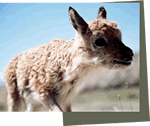 Chiru live in one of the harshest environments on earth, at an altitude of over 5,000 metres. Their special type of down fur, which is both very light and warm, allows them to survive in the freezing conditions of the plateau where they gather at one point of the year. They are migratory animals - moving down from Mongolia to Tibet noma- and traditionally followed closely by the nomads, who also make that journey every year. The nomads would hunt the antelope for all that it provided them - hide, meat, bones, horns and fur pelts - in short, everything that the nomads needed to sustain them through their journey. It is a long-perpetuated false claim, however, that nomads would gather Chiru down off of rocks and bushes, after it was naturally shed by the animals. To obtain the down fur, the animals must be hunted and killed. Multiple Chiru must be killed to gain the materials necessary for a single Shahtoosh shawl. Chiru live in one of the harshest environments on earth, at an altitude of over 5,000 metres. Their special type of down fur, which is both very light and warm, allows them to survive in the freezing conditions of the plateau where they gather at one point of the year. They are migratory animals - moving down from Mongolia to Tibet noma- and traditionally followed closely by the nomads, who also make that journey every year. The nomads would hunt the antelope for all that it provided them - hide, meat, bones, horns and fur pelts - in short, everything that the nomads needed to sustain them through their journey. It is a long-perpetuated false claim, however, that nomads would gather Chiru down off of rocks and bushes, after it was naturally shed by the animals. To obtain the down fur, the animals must be hunted and killed. Multiple Chiru must be killed to gain the materials necessary for a single Shahtoosh shawl. The nomads had no use at all for the soft down - its incredible fineness making it virtually impossible to handle - and this is where the weavers of Kashmir played their role. With their experience in handling the finest hand-combed Pashmina wool, they could weave shawls of the most exquisite quality, and thus the Shahtoosh shawl was born. When the British (of British India) traveled to Kashmir in Summer, they realised the worth of Pashmina and Shahtoosh shawls and introduced them to the world, which led to greater demand for these products. Subsequently, the antelope was hunted down specifically for its fur and this led to it now being listed as an endangered species and given the highest possible level of legal protection, whereby no commercial trade in Shahtoosh is permitted. This also led to the demise of the skill of the Kashmir weavers, who were the only ones in the world who could handle the fibre. The selling or owning of Shahtoosh was made illegal in all countries that signed the Convention of International Trade in Endangered Species. Many countries including the USA, China and India are cracking down on those involved in the Shahtoosh trade. Although Shahtoosh is banned under the agreement, illegal hunting and selling of Shahtoosh is still a serious problem in Tibet.
Care of your Pashmina 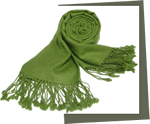 Your Pashmina Products can last you a lifetime with proper care. Your Pashmina Products can last you a lifetime with proper care.
Pashmina Products should be professionally DRY-CLEANED . If the natural smell of the Pashmina fiber is not pleasant for you, it is recommended to dry-clean your Pashmina Product to remove the smell.
To iron your Pashmina Products, always use a piece of cloth and iron on low heat.
When not using your Pashmina , store it in a dry and cool place. Please note that Perkal Gifts is a corporate gift supplier and only sells pashminas as corporate gifts and not on a retail basis.
 Lead times Lead times Although there is minimal amount of stock available these are generally is assorted colours and styles. Our corporate pashminas come in white and are then dyed up according the clients colour needs. The lead times are 2 – 3 weeks for these pashminas.
Colours The pashminas are dyed in a very wide variety of colours. In fact we have over 250 colour options available. Please go through the colour chart and make a selection based on your corporate identity.             |